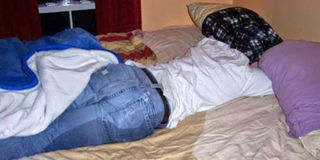Study: Bedwetting is a treatable condition

What you need to know:
- Unfortunately, the study says bedwetting also affects adults as much as there isn’t enough information on the matter.
Dar es Salaam. Have you ever come across a family member who wets the bed?
It is a common condition in children, according to a study titled “Nocturnal enuresis among children in Morogoro Region in Tanzania,” published in the Tanzania Medical Journal in 2020.
The study was conducted by the Muhimbili University of Health and Allied Sciences (Muhas).
Unfortunately, the study says bedwetting also affects adults as much as there isn’t enough information on the matter.
Further, the study highlights that the majority of the Tanzanians don’t know that the condition is curable in modern hospitals.
The study, which aimed to determine the bedwetting prevalence among children aged between five and 14, focused on 12 neighbourhoods and involved 510 children.
The study findings show that bedwetting was noted in 19 percent out of 150 children, with the victims having been found to have both primary and secondary stages.
Speaking with The Citizen, Muhas Don and research participant Prof Francis Furia said the focus of the study was on determining the magnitude of the problem in Tanzania.
He said bedwetting was not a disease but rather a symptom of many other diseases, including effects on the brain system, spinal cord, bladder complications, the delayed process of the urinary tract being strong, or constipation, to mention a few.
“It is important for people with bedwetting to make early hospital visits for treatment. The most important thing for people to know is that bedwetting is treatable,” said Prof Furia.
Further, the study shows that the children wetting the bed have been receiving severe punishment from their parents, who, unknowingly, fail to realise that such children need assistance.
Ms Flora Mgonja admitted having been punishing her two children for bedwetting, a condition with which they have been for more than 14 years.
Ms Mgonja explained that she had been instructing her children to limit their liquid consumption, especially starting at 4pm, efforts of which, she said, didn’t work.
“The bad side of everything is that I didn’t know that they were facing the challenge that required the attention of medics in modern hospitals,” she said.
Mr Timothy Zacharia, 50, said bedwetting had prevented him from spending a night outside his home until he attained the age of 27 when he started his own life.
“My siblings used to visit other family members in different regions, but I never did that to free myself from the shame of bedwetting,” he said.
Mr Zacharia, a married man and father of two, said he was still experiencing bedwetting at his age.
However, Dr Furia says primary bedwetting can be treated, hinting that treatment depends on the sufferer’s history.
“Some of the affected may be forced to be treated psychologically or medically,” he said, highlighting some of the treatment methods including introducing bed alarms to wake up a child immediately after starting urinating.
However, Dr Furia called for the increased awareness of the condition to allow more children to get treated.





